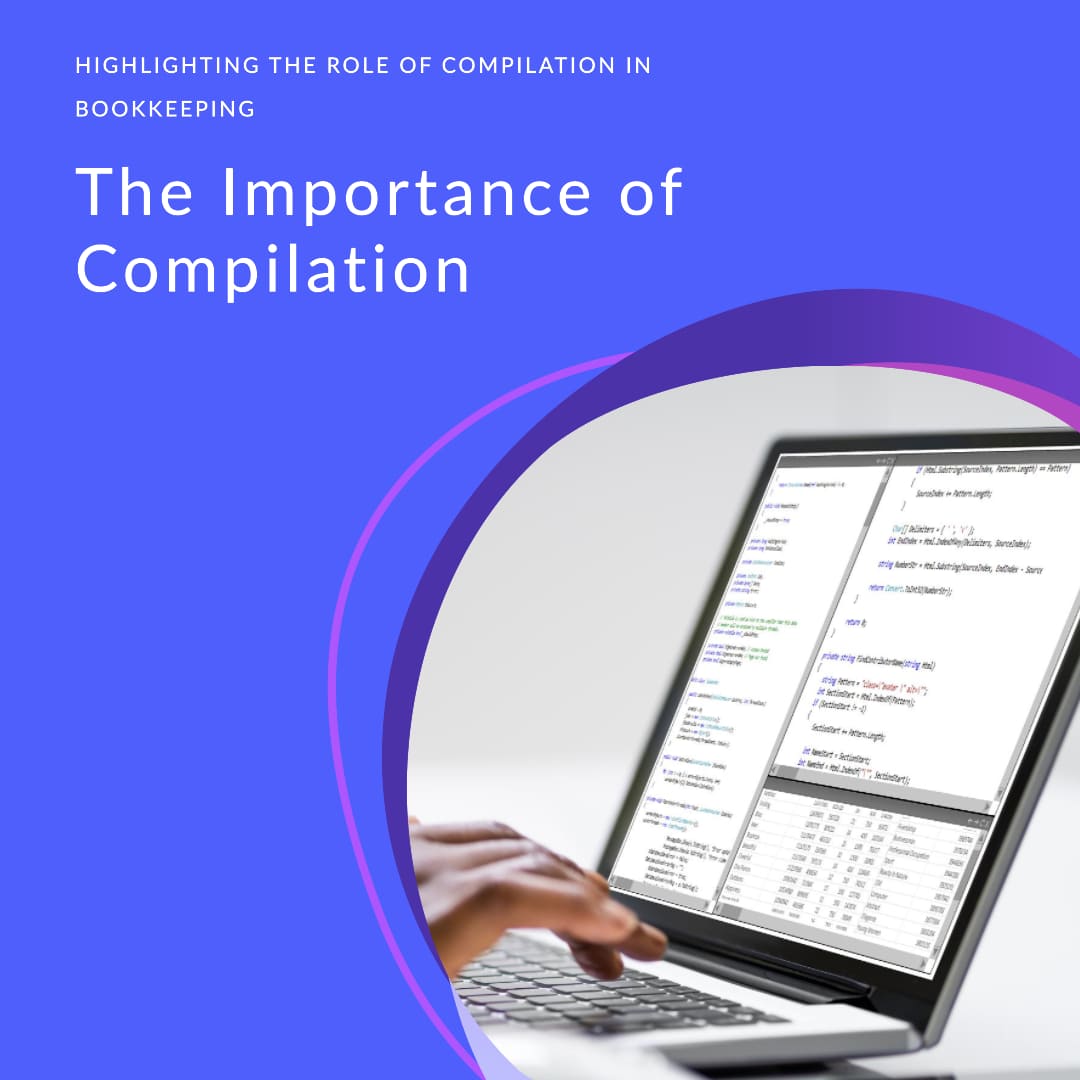Introduction of Bookkeeping and Compilation
Bookkeeping and compilation are two fundamental accounting processes that play distinct yet interconnected roles in managing a company’s financial information. While they are often used interchangeably, it’s crucial to understand their differences and how they contribute to the financial health and decision-making of a business. In this article, we’ll delve into the disparities between bookkeeping and compilation, highlighting their individual significance.
Bookkeeping:
Bookkeeping is the systematic recording, organizing, and classifying of financial transactions of a business. It involves maintaining accurate and up-to-date records of income, expenses, assets, liabilities, and equity. Bookkeepers are responsible for recording daily financial activities, such as sales, purchases, payroll, and other transactions.
 Key Tasks in Bookkeeping:
Key Tasks in Bookkeeping:
- Recording Transactions: Bookkeepers record all financial transactions, ensuring that each entry is categorized correctly and supported by relevant documentation.
- Reconciliation: They reconcile bank statements, credit card statements, and other financial accounts to identify discrepancies and ensure accuracy.
- Financial Statements: Bookkeepers prepare essential financial statements, including income statements, balance sheets, and cash flow statements, based on the recorded transactions.
- Data Organization: They organize financial data in a manner that facilitates analysis and decision-making by management.
Importance of Bookkeeping:
Accurate and well-maintained Bookkeeping and Compilation is crucial for several reasons:
- Financial Visibility: It provides a clear picture of a company’s financial health and performance, enabling informed decision-making.
- Regulatory Compliance: Proper bookkeeping ensures compliance with tax laws and other financial regulations, reducing the risk of penalties and audits.
- Business Planning: Historical financial data from bookkeeping helps in forecasting and developing effective business strategies.
- Compilation: Compilation is a higher-level accounting service that involves the gathering and presentation of financial information into a formal financial statement. A compilation engagement is usually performed by a Certified Public Accountant (CPA) or a professional accounting firm. Unlike an audit or review, a compilation does not involve the accountant providing any assurance of the accuracy of the financial statements.
Key Tasks in Compilation:
- Data Review: Accountants gather financial data from the company’s bookkeeping records and review it for completeness.
- Financial Statement Preparation: Based on the compiled data, accountants prepare financial statements, including the income statement, balance sheet, and related notes.
- Communication with Management: Accountants may discuss the financial statements with management to ensure accuracy and resolve any queries.

Importance of Compilation:
Bookkeeping and Compilation services are beneficial for businesses in several ways:
- Presenting Professional Financial Statements: Compiled financial statements lend credibility to a company’s financial information, especially when dealing with external parties like investors or lenders.
- Facilitating Decision-Making: The compiled financial statements provide management with a clear understanding of the company’s financial position, enabling strategic decision-making.
- Regulatory Compliance: Compiled financial statements may be required by regulatory authorities or stakeholders to assess the company’s financial health.
Conclusion of Bookkeeping and Compilation
Bookkeeping and compilation are essential components of a company’s financial management process. While bookkeeping focuses on recording and organizing day-to-day financial transactions, compilation involves presenting this information in the form of formal financial statements. Both services contribute significantly to a business’s financial health, decision-making, and compliance with regulatory requirements.
For small businesses, maintaining accurate bookkeeping records is the first step toward availing compilation services. By understanding the distinction between these two processes, business owners can make informed decisions about their accounting needs and seek professional help when necessary to ensure financial transparency and stability.
Below is a table summarizing the key differences between bookkeeping and compilation:
| Aspect | Bookkeeping | Compilation |
|---|---|---|
| Definition | Recording financial transactions | Preparing financial statements |
| Purpose | Maintaining accurate financial records | Summarizing financial data |
| Scope | Day-to-day transactions | Complete financial picture |
| Focus | Transactional details | Financial statement preparation |
| Responsibility | Bookkeeper | Accountant or CPA |
| Process | Recording, classifying, and reconciling | Aggregating data and creating financial reports |
| Financial Reports | Not involved | Involved (e.g., balance sheet, income statement) |
| Frequency | Ongoing process | Periodic (usually at the end of an accounting period) |
| Legal Requirement | Not legally mandated | Sometimes required by authorities or stakeholders |
| External Audit | May or may not be subject to external audit | Often subject to external audit |
Bookkeeping is the process of systematically recording financial transactions, such as sales, purchases, receipts, and payments, in the accounting system. Bookkeeping and Compilation involve maintaining accurate and detailed records of day-to-day financial activities. On the other hand, compilation refers to the process of summarizing financial data from various sources and organizing it to prepare financial statements like the balance sheet, income statement, and cash flow statement.
Bookkeeping is primarily carried out by a bookkeeper, while compilation is typically performed by an accountant or a Certified Public Accountant (CPA). Bookkeeping and Compilation involves tracking transactional details and focuses on creating comprehensive financial reports.
Bookkeeping does not necessarily involve the preparation of formal financial statements, while compilation directly leads to the preparation of financial statements. Compilation is often performed periodically, such as at the end of an accounting period, while bookkeeping is an ongoing process.
While bookkeeping is essential for accurate financial reporting, it is not legally mandated in all cases. However, compilations may be required by external parties, such as tax authorities or stakeholders, and they are often subject to external audit.



